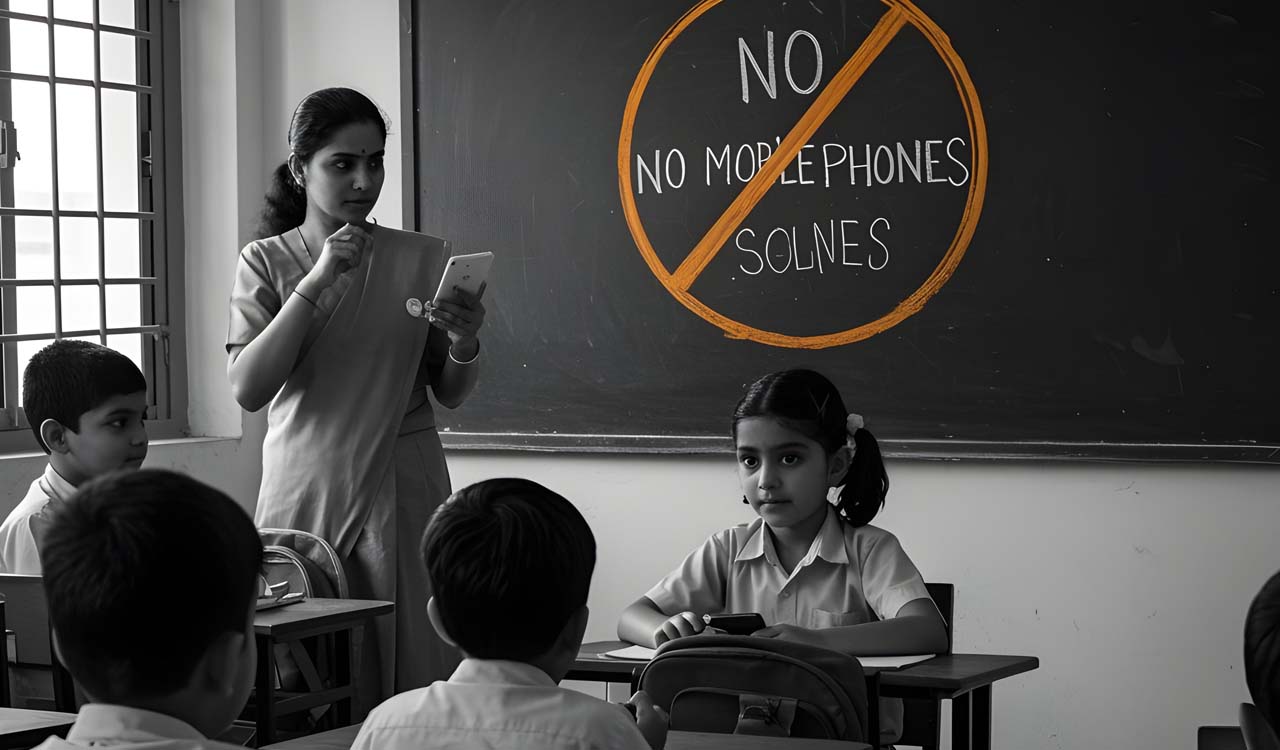Opinion: Cell phone ban — Accountability beyond classrooms
Treating schools as laboratories for ideal behaviour while turning a blind eye to poor work ethics in public institutions is dangerous and teaches children that accountability is age-bound

By Chada Rekha Rao
In 2012, a disturbing image flashed across news channels and social media feeds: three ministers from Karnataka caught on camera watching adult videos during a legislative session. The nation gasped. It was more than just an ethical lapse — it was a symptom of how far mobile phones had intruded into even the most sacred spaces of public responsibility. And yet, 13 years later, not much has changed.
Also Read
Fast forward to 2025. A recent directive by the Siddipet District Education Officer, prohibiting mobile phone usage during instructional hours in all government schools, has received overwhelming support. The move is widely seen as a progressive step toward restoring attention, discipline, and decorum in classrooms. At a time when digital devices are omnipresent, this effort to cut down distractions and bring focus back to the learning process is both welcome and necessary.
But as schools scramble to implement this order, one question looms large: Why is the mobile phone ban being selectively enforced only in schools?
Problem Larger Than Classroom
While school environments undoubtedly require discipline and distraction-free zones, it is intellectually dishonest and socially unfair to believe that the misuse of mobile phones is an issue limited to students and teachers. In fact, one might argue that it is outside the school gates — in government offices, public hospitals, state-run banks, transportation departments, and municipal buildings — where the consequences of mobile distraction are far more severe and damaging.
Walk into almost any public office today and you’ll find employees tapping away on WhatsApp, browsing Facebook, glued to YouTube or streaming television dramas on duty. This sight is so common that it no longer surprises anyone. But it should.
Time Lost is Public Time Wasted
Let’s try to understand this loss with data. If a single government employee spends just one hour per working day on personal mobile use: That’s 22 hours per month, assuming a Workday month. Over a year, that adds up to 264 hours—more than 33 full workdays per employee.
Now, consider a government department with:
- 100 employees: 2,200 hours/month → 275 full workdays lost.
- 1,000 employees: 22,000 hours/month → 2,750 workdays lost.
- 10,000 employees: 2,20,000 hours/month → 27,500 workdays lost.
These are not hypothetical numbers. They represent real losses in citizen services. They translate into postponed files, delayed clearances, overlooked grievances, and in some cases, even avoidable medical emergencies. Every hour spent watching videos or chatting on the phone during duty hours is an hour stolen from public welfare.
Ironically, the same society that collectively cheers when mobile phones are banned in schools is conspicuously silent when government employees indulge in the same behaviour, often during critical work.
The Great Double Standard
Discipline is something we demand only from students and teachers. Why should a school principal confiscate a Class 9 student’s phone, while the ward boy in a hospital chats away as patients lie unattended? Why do we mandate silence and focus in a classroom, but accept endless scrolling in a panchayat office or a land registration office?
Why do we treat schools as laboratories for ideal behaviour while turning a blind eye to poor work ethics in our public institutions? This double standard is not just unfair — it’s dangerous. It teaches children that accountability is age-bound. That ethics are conditional. That as you grow older, you grow out of responsibility.
The truth should be the opposite. The older you are, the more responsible you should become. And the more power you hold, the more accountable you must be. The push for digital discipline in schools should be seen as a starting point, not the final frontier. Education and governance are the twin pillars of a healthy democracy. If one must be ethical, the other cannot afford to be indifferent.
What Schools Can Teach
Ironically, schools — often seen as low on the power hierarchy — are leading by example. Imagine if the same principles were applied to government offices: Phones off during public hours; Mandatory call logs for official communications; No access to social media apps during duty hours; public counters free of personal phone interruptions. The results could be transformative. Files would move faster. Queues would shrink. Citizens would be treated with more attention and empathy. And most importantly, trust in public institutions would be restored.
Digitally Disciplined Public Sector
If India is serious about accountability, we need to move from fragmented bans to a systemic digital discipline policy. Here’s a 6-point roadmap to begin with:
- Uniform mobile usage policy across departments: All government offices should adopt a standard policy: mobile phones are to be used strictly for official communication during work hours. Personal use should be permitted only during lunch breaks or emergencies.
- Mandatory use of basic phones for frontline workers: Frontline workers in healthcare, police, and administrative services can be given basic feature phones for duty use. Smartphones may be accessed only after office hours or during breaks.
- Time-tracking and digital surveillance tools: Just as student screen time is tracked in some schools, employee mobile usage can be monitored through time-tracking apps that flag personal use during designated hours. This is already being piloted in some private sector firms and can be adapted with privacy safeguards.
- Public display of productivity metrics: Display boards in public offices can show average service times, pending case counts, and resolution timelines. This will encourage real-time accountability and reduce complacency.
- Training & sensitisation campaigns: Workshops can be held periodically to remind public employees that their time is public property. Mobile misuse should be treated as professional misconduct, not a harmless habit.
- Recognition & penalty systems: Departments showing disciplined digital behaviour and timely service delivery should be rewarded publicly. Repeated violations should lead to written warnings, suspensions, or pay cuts — just as they would in schools or private firms.
Let us not mistake this as an anti-technology stance. On the contrary, India’s journey toward digital governance has been laudable. Initiatives like Aadhaar, DigiLocker, UMANG app, Digital Land Records have shown how the right use of technology can make governance faster, transparent, and citizen-centric.
Accountability is for All
Discipline must not be seen as the sole domain of students and teachers. This mindset must change. It is time for a culture shift, not just a classroom reform. It is time we admit that real accountability doesn’t begin with children. It begins with the adults they learn from. If children can give up their mobile phone to focus in class, surely a government officer can do the same to serve the people.
Democracies mature not just through laws, but through equal expectations of discipline and ethics across every sector of society. Let us not waste another hour of public time.

(The author is Principal of Oxford Grammar School, Hyderabad)
Related News
-
Modi, Macron vow deeper defence, trade partnership
2 hours ago -
Sports briefs: Dharani, Tapasya clinch honours
2 hours ago -
Man arrested for cultivating ganja plants in Telangana’s Adilabad
2 hours ago -
Second successive win for Titans in Samuel Vasanth Kumar basketball
2 hours ago -
Women councillors allege misconduct by Congress in Kyathanpalli
3 hours ago -
Gauhati Medical College doctor lodges FIR alleging harassment by principal
3 hours ago -
Two FIRs filed in Chikkamagaluru after week-long stone pelting on house
3 hours ago -
Viral video shows SUV hitting biker in Dwarka, teenage driver detained
3 hours ago




